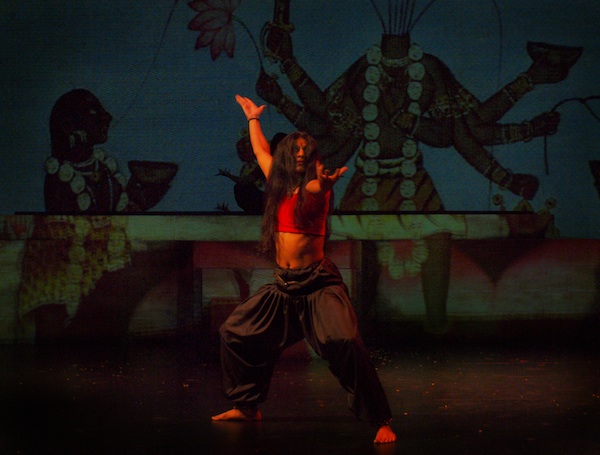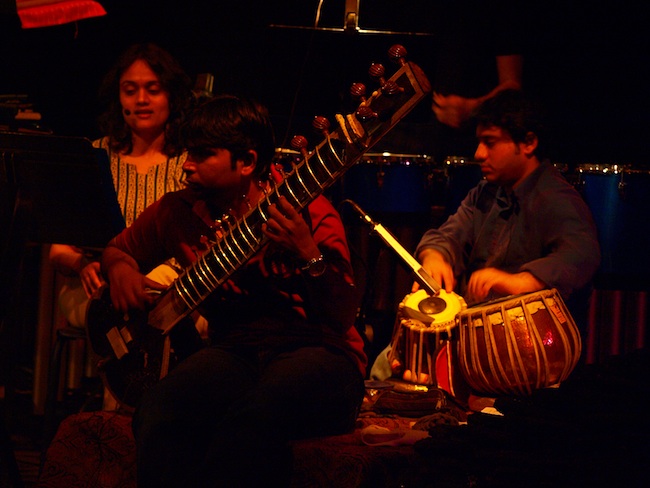Contribute
| Phoolan Devi: The Bandit Queen |
Ranjani Saigal
04/26/2010
Shrish Korde’s brilliant Multi-Media chamber opera describing the life and times of Phoolan Devi had many original elements including setting an Atlantic Monthly interview to music and incorporating Indian classical music and dance alongside western operatic singing creating a very unusual and new sound.
In her short life, Phoolan Devi captured the popular imagination as a victim of social injustice, then as a dreaded avenger and finally as a charming politician who learned to skillfully exploit her past for political gain. Veteran classical composer Shirish Korde took on the challenge of translating this tale with all its gory and unpalatable details into a classical presentation. The product he created was not only tasteful and brilliant as a work of art but also succeeded in creating new sights and sounds by blending eastern and western classical music and dance. Music Director Richard Pittman and the Boston Musica Viva group, stage director Lynn Kremer, videographer Raphaele Shirley, set and light designer Barbara Craig, costume designer Kurt S. Hultgren and choreographers Prachi Dalal and Lynn Kremer, supported him in this task.
The event had several showings including one at the Tsai Center for the Performing Arts on April 24, 2010.
The interview in the Atlantic Monthly on Phoolan Devi was the motif for the production and amazingly every word from the interview was set to music. Korde deserves great applause for this composition. Taking ques from the interview the opera elaborated on different aspects of Phoolan’s life. Sopranos Zorana Sadiq and Elizabeth Keuch were wonderful as the Phoolon and the interviewer. Zorana’s singing was certainly a key highlight of the piece.
Opening with her happy childhood in a little village the opera depicted the life and times of little Phoolan who was born in a fisherman clan. The combination of the background visuals seamlessly integrated with the props succeeded in transporting the audience to the village. Kathak choreographies along with folk dances were used to show the life of Phoolon. Urmila Mallick was delightful as little Phoolon. While the dancing and the choreography were nice, there was not a tight amalgamation of this piece with the rest of the work and hence appeared to just be stuck in there rather than fully integrated and hence a little out of place.
Unlike the lack of integration in the dance portion the Western and Eastern classical music were tightly integrated and were absolutely seamless. Aditya Kalyanpur on the Tabla, Vocalist Deepti Navaratna and Chirga Katti on the Sitar were delightful. The high-pitched voice of Deepti (unusual for a Carnatic Vocalist) was smooth and Bhava laden as she rendered several Hindustani style music compositions. At many spots in the opera, Korde had Zorana and Deepti sing together. Their notes blended beautifully and it made for a wonderful musical experience.
After the childhood, the opera moves on to show the marriage of Phoolon at the age of 11 who was sold to man three times her age. Korde used M.S. Subbulakshmi’s Vishnu Sahasranamam as the background music for the wedding. Korde was obviously moved musically by the meter and the rendition and decided to use it. But the piece (which was referred to erroneously as Vedic Chants in the brochure) was rather out of place as a background score for a marriage in the Chambal Valley. Use of folk songs would have been more appropriate at Phoolon’s wedding. A more jarring note came when the same composition was used while depicting the gang rape of Phoolon. Later in the production Korde used the meter of the composition without using the words, which was more palatable. (Of course in an Indian composition the meter is considered as sacred as the composition itself, which is why the meter of Gayathri, is revered as Devi).
The second half the opera was more dynamic than the first. The use of lighting and shadow play to show both the abuse of Phoolon and later the tender uniting of Phoolon with her lover was marvelous. The use of North Indian folk songs was extremely appropriate and transported us to the ravines.
Phoolon’s transformation from an ordinary woman to the gang leader was appropriately depicted via a Durga Prayer. Mesma Belsare and Prachi Dalal’s brilliant choreography in the Durga piece fit beautifully into the piece even though it was in the Bharatanatyam style. The dance was choreographed to suit the mood of the piece and was not quite set to the words. The words of the song which referred to Durga in her beautiful form with reference to Shringara aspect of Devi would not have been appropriate for the moment and hence Dalal and Belsare decided to deviate from the words. Again Korde seems to have selected the piece more from a musical perspective rather than for the lyrics. Using a more powerful voice than Deepti’s (perhaps a male voice) for the Sollukattu rendition (Rhythmic Syllables) would have brought more power to the piece.
Mesma stole the show as the adult Phoolon. Her every move was carefully chosen to present the mood of the moment and each movement was filled with emotion. The music and modern dance choreography was appropriate and powerful as it showed the incarceration of Phoolon. Having Zorana sing pure notes (Sa Ra Ga Ma) as she is campaigning was nothing short of genius on Korde’s part. The visuals that drew both from newspaper articles of Phoolon Devi and those created to support the scene were magnificent.
Overall the effort was amazing. The story of Phoolon is not a classy tale and making it classy requires the hands of a master which Korde and his team prove they are. With so many elements in the Opera, creating a seamless presentation that leaves the audience asking from more is surely a daunting task and kudos to Korde for this brilliant work.
You may also access this article through our web-site http://www.lokvani.com/
Soprano Zorana Sadiq as Phoolan Devi
Photos by William J. Rynders
Prachi Dalal as Phoolans sister, Rukmini, dancer Urmila Basu Mallick as young Phoolan, and dancer Ni Luh Suasthi Bandem as Phoolans mother
Dancer Urmila Basu Mallick as young Phoolan, dancer Prachi Dalal as Phoolans sister, Rukmini
Soprano Elizabeth Keusch as the interviewer; soprano Zorana Sadiq as Phoolan Devi

Mesma Belsare

Deepti Navaratna, Chirag Katti, and Aditya Kalyanpur